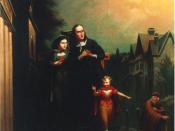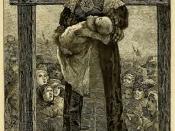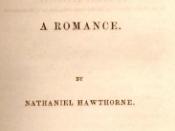Irish novelist Brian Moore observed, 'There comes a point in many people's lives when they can no longer play the role they have chosen for themselves' (Bookshelf 95). From Hollywood movie stars to professional athletes, people have and will continue to lead false lives, under the public spotlight, concealing their personal travails. In literature, the preceding statement has held true numerous times, in works such as Nathaniel Hawthorne's The Scarlet Letter. Minister and respected citizen, Arthur Dimmesdale, was perceived as an upstanding member of the community who preached the word of the heavenly Father. But before the public, he was only camouflaging his dark, hidden secret, which was the sole cause of his sufferings. Hawthorne successfully portrayed the personal agonies one would suffer by cowardly holding secrets within oneself.
In the Scarlet Letter, Hawthorne set out to show the consequences of leading a double life. Arthur Dimmesdale, to the people of Boston, was a holy icon.
According to the public, 'never had a man spoken in so wise, so high, and so holy a spirit, as he... nor had inspiration ever breathed through mortal lips more evidently than it did through his' (167). Dimmesdale had risen through the ranks of the church and had the utmost respect of the people of Boston. Dimmesdale's 'eloquence and religious fervor had already given the earnest of high eminence in his profession' (48). Hawthorne pointed out that Dimmesdale was a very influential and powerful speaker, whose soft spoken words, 'affected them [the townspeople] like the speech of an angel' (48). Dimmesdale also had the ability to preach unmatched sermons, containing messages that could touch souls. This was the case during a service following his vigil when, 'Souls... were brought to the truth by the efficacy of that sermon, and vowed within themselves to...


